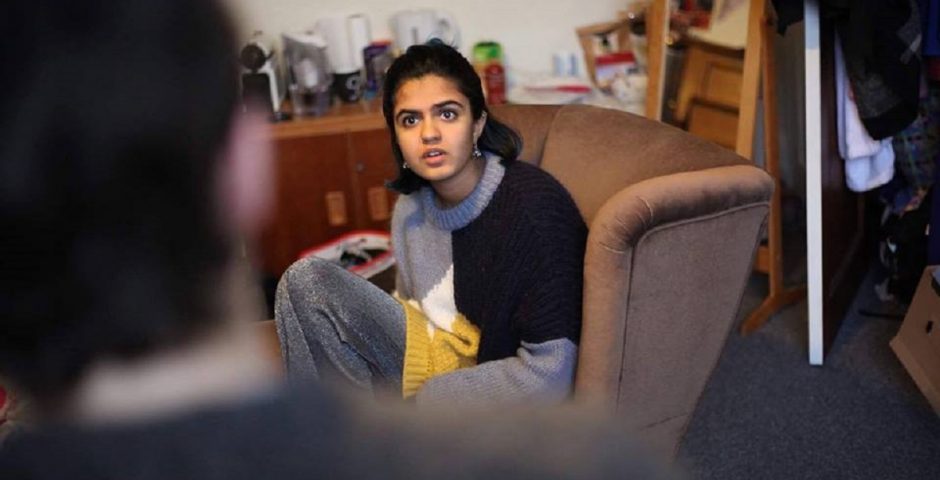
REVIEW: Cigarettes and Chocolate
Silence has never been so violent.
Taking on a play which demands of its principal character to stay silent and do very little for much of the duration, proves both a brave and inspired decision in this ADC late show.
As cigarettes paired with chocolates would suggest, this is a bittersweet play. Gemma (Amiya Nagpal), inspired by the asceticism of the monks, decides to give up talking for Lent. Her self-immolation aggravates and provokes those around her, as they surrender their darkest secrets to her silence.

Silence is golden?
Alive with awkward and often pregnant pauses, Cigarettes and Chocolate achieves a believable naturalism to the challenges of non-verbal communication, often causing squirm-inducing silences as both actors and audience hang expectantly on the release of every word . The opening, which has the whole cast assembled on stage effectively sets up, under the direction of Emily Galvin, the idea of disassociated voices speaking into silence and receiving no inadequate answer, through the mediated recording of voicemail messages.
Without little for the actors to respond to in their fellow actors the play presents a unique challenge. However the challenges of Minghella’s script, which has Gemma only breaking her silence at the opening and close, are on the whole masterfully handled. Despite the length of the monologues being sometimes strained, the cast are to be commended for what are challenging roles, deprived as they for much of the play of a verbal communion with those they share the stage with.

Eduardo Strike as Rob
The stage set, although cluttered, provided a pleasingly busy backdrop for the senses, suffering under the weight of Gemma’s silence. Gemma’s plush leather chaise-longue looked like something you might find in a therapist’s office and indeed this role of a silent listener took on form throughout the play, not just in Gemma but in other characters who listened with an extraordinary patience. Sample (Ben Martineau) and Concepcion’s (Linnea Lagerqvist) auditory roles are entirely taken for granted by other characters and provide soundboards for those who speak at them rather than to them. Although the pace was sometimes a little pained, this can most likely be put down to the deliberate frustration in the almost entirely one-sided dialogues.
Silence acts a violent release for those inhabiting it when trivial meanderings through dialogue take sharp, profound turns into revelation. Ideas of language clotting, seeping and even retching weave through the play as Gemma’s silence provokes either trivial digressions or violent truths.

Fran Davis as Lorna
Implicitly, violence leers on on the periphery with the tone often moving from light to dark very abruptly, something which is played out convincingly by Eduardo Strike as Rob, who veers aggressively from white noise to surprisingly confessional aggression. The carelessness of Gemma’s silence goes so far as to become cruel in the face of the lovelorn Alistair (played to endearing effect by Comrie Saville-Ferguson) who heart-wrenchingly tries to underplay his love with on one of the best lines of the play: “I love you in brackets”.
However, the stand-out performance of the night came from Emily Collinson as the pregnant Gail. The source of many of the play’s more comic moments, her attempt to pierce the awkward silences with bumbling trivialities often provided most of the laughs which only made her later revelation even more compelling. The scene where she interrupts a tete-a-tete, precariously seating herself on a stool, between the self-occupied Rob and the intimidatingly brusque Lorna (Fran Davis) was particularly well-navigated.

Amiya Nagpal as Gemma
The idea that we live “in a time which knows the price of everything but the value of nothing”, as quoted from Oscar Wilde, becomes apparent when Gemma finally, in a great release for the audience, breaks her silence. Her poetic end to the play is a contrast to the naturalistic ramblings – often trivial and occasionally profound in their revelations – of those who were at the receiving end of her impenetrable wordlessness. With references to Vietnamese babies, the trials of Lent and the asceticism of Bach’s Matthew Passion woven skilfully throughout, Gemma’s romanticisation of suffering and self-martyrdom becomes empty and thoughtless, only holding meaning in so far as it provokes others.
Stark in the violence of its silence, this ADC late show is an unnervingly compelling production.
4/5









































